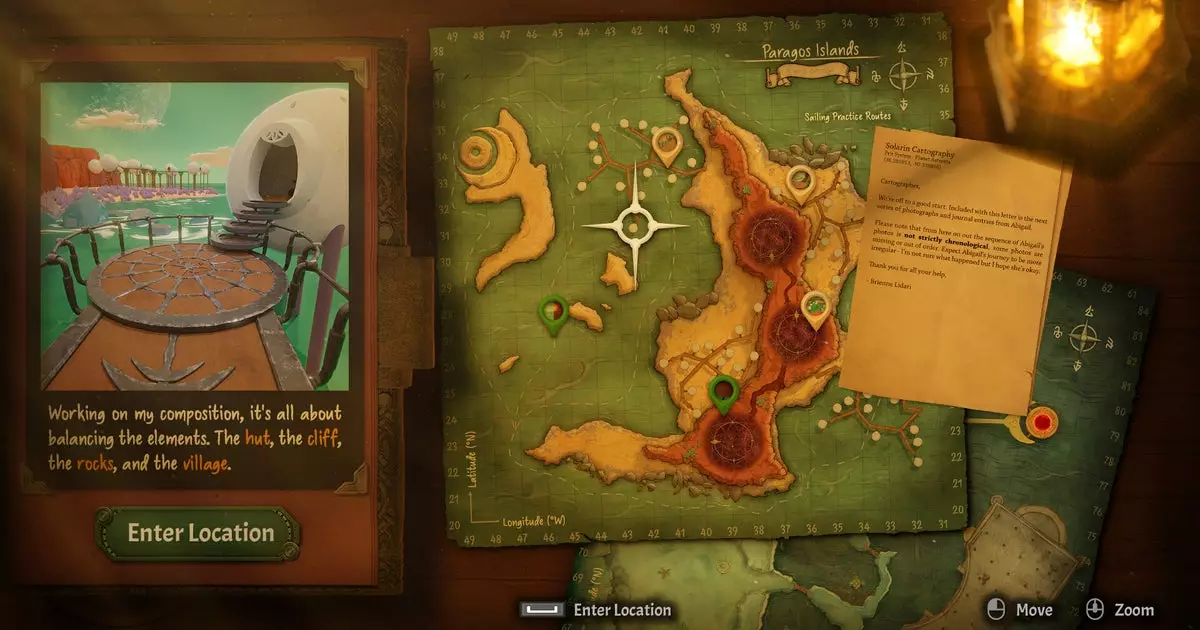For enthusiasts of mystery and alien landscapes, *Locator* offers a captivating blend of exploration and deduction. Set within an enigmatic extraterrestrial realm, this game intriguingly positions players as interstellar cartographers on a quest to uncover the whereabouts of the missing archaeologist, Abigail Lidari. Drawing inspiration from the geography-based online game *Geoguessr*, *Locator* invites players not only to engage in puzzle-solving but also to delve deep into an immersive narrative that gradually unravels.
What sets *Locator* apart is its unique approach to storytelling intertwined with exploration. Players carefully analyze a selection of photographs alongside Abigail’s cryptic journal entries to determine her location amidst stunning maps of an alien world. This dynamic not only requires dexterity in puzzle-solving but also demands a profound empathy for Abigail’s experience. One of the game’s early challenges involves identifying colossal, ancient statues within an expansive cavern, mirroring the curiosity and isolation one might feel while navigating an uncharted environment. The creative essence of faunal representation—where Abigail whimsically names her findings and adorns her sketches with playful embellishments—captures the human spirit of adaptation and humor in the face of solitude.
The core mechanic of *Locator* revolves around the duality of spatial awareness and interpretative reasoning. The game’s premise pushes players to adopt Abigail’s perspective, urging them to envision the world through her eyes. This shift in viewpoint not only enhances engagement but also encourages players to appreciate the nuances of environment and context. As players begin pinning locations based on visual and textual clues, the game gracefully transitions from simple landmark identification to deeper analytical challenges requiring an understanding of angular relationships and environmental storytelling.
Fiction Meets Reality: The Philosophy of Mapping
Maps often serve more than just navigational purposes; they symbolize the confluence of language and geography. The concept of ‘cartographer’s folly’—fictitious places injected into maps—reminds players of the delicate line between representation and reality. Alfred Korzybski’s philosophical assertion that “the map is not the territory” remains pertinent here. *Locator* elegantly embodies this sentiment, pitting players against the limitations of their knowledge as they attempt to reconstruct Abigail’s journey based on fragmented information. This tension between reality and representation dials up the emotional stakes, enriching the player’s experience as they ponder what it means to truly know another person.
Despite the absence of a confirmed release date, interest in *Locator* is palpable. Its ability to intertwine detective reasoning with the visual allure of alien cartography presents a promising venture into gameplay that combines cognitive challenges with an exploration of emotional resonance. As players await its arrival, there’s a burgeoning fascination with how *Locator* will expand on these themes, sparking curiosity about our connections to both, the explorers of the universe and the landscapes they traverse. In a world where understanding often hinges on perspective, *Locator* stands poised to offer both challenge and insight in the guise of an interstellar odyssey.


Leave a Reply